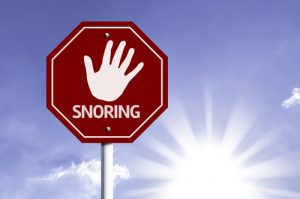Posted on Wednesday, May 1st, 2019 at 7:11 pm

The three primary types of sleep apnea are:
- Obstructive sleep apnea – The most common form of apnea where the muscles in the back of the throat relax, failing to keep the airway open. It can cause you to stop breathing for up to 30 seconds at a time many times throughout the night.
- Central sleep apnea – The brain does not control breathing during sleep. Central sleep apnea may happen as a result of other health conditions, including stroke and heart failure. Sleeping at a high altitude can also contribute to central sleep apnea. Treatments involve treating existing conditions, using a device to assist breathing, or using supplemental oxygen.
- Complex sleep apnea syndrome – Occurs when you have both obstructive and central sleep apnea.
Snoring is the most common symptom of sleep apnea. However, not all snorers have sleep apnea. If you have sleep apnea, the snoring is likely to be followed by silent breathing pauses and choking or gasping sounds.
Sleep apnea can affect people of all ages, although some of the symptoms are different depending on your age.
Common symptoms of sleep apnea include:
- Frequent, loud snoring
- Silent pauses in breathing
- Gasping or choking sounds
- Fatigue and daytime sleepiness
- Unsatisfying sleep
- Insomnia
- Chest pain at night
- Headaches in the morning
- Irritability
- Waking up to go to the bathroom
- Trouble concentrating
- Forgetfulness
- Decreased sexual desire
Untreated sleep apnea is associated with health risks, so it is critical you consult a doctor if you experience any of the above symptoms.
Sleep Apnea Risk Factors
Some people are at a greater risk of sleep apnea. Men are more likely to have it than women. However, the risk for women increases after menopause. Being overweight or obese greatly increases the risk of sleep apnea.
Hypertension is often linked to sleep apnea. High blood pressure can cause sleep apnea or worsen breathing in patients already affected by sleep apnea. Sleep apnea and high blood pressure are both associated with a greater risk for serious complications like heart attack and stroke.
Treatment
For milder cases of sleep apnea, your doctor may recommend lifestyle changes, such as quitting smoking or losing weight. If you have allergies, your doctor will probably recommend medication or a nasal spray. If these measures don’t improve your apnea symptoms, a number of other treatments are available for moderate to severe apnea. The most common treatment is the use of continuous positive airway pressure (CPAP), which involves a machine delivering air pressure through a mask while you sleep.
Sleep Apnea In Children
According to Johns Hopkins Medicine, 10%-20% of children who snore may have sleep apnea. Overall, an estimated 3% of children have sleep apnea. Warning signs of sleep apnea to look for in your child include snoring, breathing pauses during sleep, bedwetting, daytime fatigue, and mouth breathing while they’re asleep and awake.
See a Doctor
If you recognize any of the symptoms and warning signs mentioned in this article, talk to your doctor as soon as possible. A doctor will probably recommend a sleep study (which can be done from the comfort of your own home) that examines your breathing patterns while you’re asleep. The sooner you identify and begin treating sleep apnea the better. At Silent Night Therapy, we are passionate about helping our neighbors in New York get better sleep. Contact us today at (631) 983-2463 to learn more.